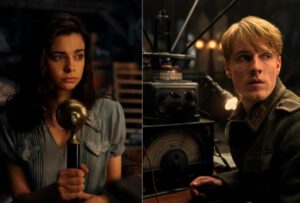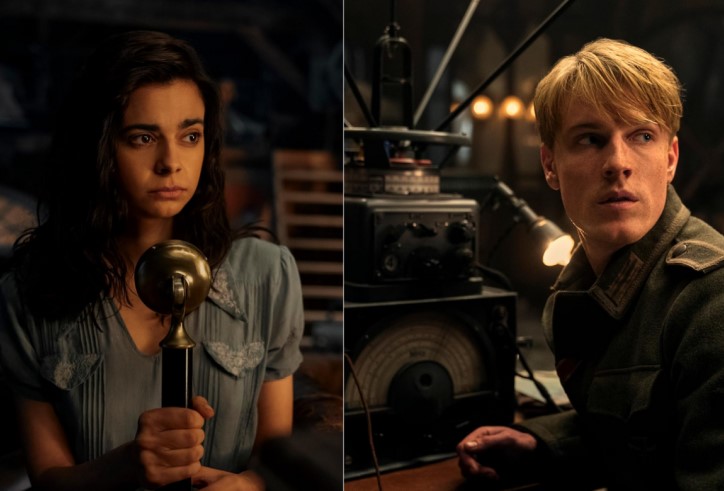Movie Info
Movie Info
- Director
- Shawn Levy
- Run Time
- 3 hours and 48 minutes
- Rating
- TV-MA
VP Content Ratings
- Violence
- 3/10
- Language
- 2/10
- Sex & Nudity
- 3/10
- Star Rating
Relevant Quotes
I am the Lord; I have called you in righteousness;
I have taken you by the hand and kept you;
I have given you as a covenant to the people,
a light to the nations, to open the eyes that are blind,
to bring out the prisoners from the dungeon,
from the prison those who sit in darkness.
the people who sat in darkness have seen a great light, and for those who sat in the region and shadow of death light has dawned.
The light shines in the darkness, and the darkness did not overtake it.

I have not yet read the Pulitzer Prize-winning novel by Anthony Doerr that writer Steven Knight and director Shawn Levy have given us in the form of a limited four-part series, and which some critics have slammed as too simplistic. Despite the latter, I fell under its spell and found it hard to wait for the next episode. I certainly agree with those who approve that it was adapted into the longer series form rather than a theatrical film, because the latter would need to have eliminated even more of the book’s events.
The two main characters are the French Marie-Laure (Nell Sutton as a child and Aria Mia Loberti as a young woman) and Werner Pfenning (Louis Hofmann) a young soldier with German Radio Surveillance. The time frame changes back and forth between August 1944 in the walled city of Saint-Malo France, and, over a decade earlier, briefly in Paris, and then a German city. As children both the blind Marie-Laure and Werner avidly listen at night to a shortwave broadcast by a man known only as “The Professor” who speaks of light, both from a physical and a metaphysical sense. “The most important light,” he teaches, “ is the light you cannot see.” Darkness is temporary, but the light you do not see is forever.
Werner is a radio tinkerer living in an orphanage with his sister Jutta (Luna Wedler), and both are repulsed by Hitler, as apparently is the kindly nun (or nurse?) in charge of the children. His sister urges her brother to stop listening to foreign broadcasts because, if caught, the penalty could be death. Werner refuses, often turning on the radio beneath his covers at night. Because he is skilled with radios and word gets around, a Nazi officer named Siedler (Ed Skrein) arrives, demanding that Werner repair his radio—or else.
Almost before you can say “Heil Hitler” the Nazi yanks the boy away to attend an elite technical training school designed to transform students into fanatic Nazis hunting down illegal broadcasters. As they part, Jutta whispers fervently that he should remain the same, “Do not let them impress you. Do not let them. Do not let them convince you. Keep the inside of your soul the same, okay? Like one of your silly radio stations, keep the frequency the same.” He promises just as the Nazi forces him to leave. The sequence at the Nazi technical training center is a nightmare experience for Werner, but he manages to graduate at the top of his class and is sent to the Eastern front where he ferrets out Partisan radio transmitters.
In Paris Marie-Laure lives with her single-parent father Daniel (Mark Ruffalo), the latter in charge of all the keys at the Natural History Museum. Hitler’s army has invaded France, causing a major exodus from the City of Light. While Daniel is gathering up the museum’s jewels to be smuggled out of the city to a safe place as the Nazis are marching into the city, his daughter is packing for their trip to join her great-uncle Etienne (Hugh Laurie) in the English Channel town of Saint-Malo. Daniel hides the jewels in the skull of a T-Rex being removed from the museum, and then takes out of a special safe a diamond worth all the other gems put together. Known as “The Sea of Flames,” it supposedly cures illnesses and grant the one who touches it, thus becoming its owner, to live forever. However, there is a catch, it will bring disaster to the owner’s loved ones.
Barely escaping from the Nazis in Paris, the father and daughter have a harrowing journey, but do reach their destination, the uncle’s house in Saint-Malo, where their aunt, Madame Manec (Marion Bailey), opens the door at their knock. She warmly welcomes them and explains that Etienne is in the attic with his radio. While her father goes up to greet his uncle, Manec tells her niece about her husband’s horrible experiences in the WW 1 trenches. In flashbacks we see through his eyes the carnage of a shelling and a gas attack, the man obviously suffering from PTSD which has led to his agoraphobia. He has not left their house in years.
Informing the girl of his radio broadcasts, Madame Manec mentions his saying “all the light we cannot see.” We see by the surprised expression on Marie-Laure’s face that this triggers the memory of a decade ago when she had been inspired by the night-time broadcasts of the Professor. When her father and uncle enter the room, she can barely speak as Daniel introduces their host, now realizing who her uncle is.
Uncle and niece soon bond, and Daniel constructs in the attic a model of the town so that he can teach his daughter how to get out and about on her own. (He had done this a decade earlier in Paris, wanting the girl to be as self-reliant as possible.) Daniel measures out the length of the blocks so that he can build the model to scale, thus creating rumors about the stranger counting his steps. Marie-Laure encourages her uncle to go outside, with Etienne eventually setting foot outside the house and becoming involved with the local Resistance group. One day as he leaves, he tells her he will be back within a few days. He does not return, so at night Marie-Laure broadcasts pleas to him, as well as to her father. Daniel had traveled to Paris a year earlier and also failed to return within the time he had promised. Marie-Laure follows her personal messages with readings from Jules Verne’s 20,000 Leagues Under the Sea.
There quickly follows a devastating raid by the US Army Air Forces, 565th Bomb Squadron. The Nazis surmise that the Americans are receiving information on what facilities for the bombers to target. (It is now late 1944, with the Americans poised to free Saint-Malo.) Listening to the broadcast is Werner. He is attracted by her voice and the knowledge that both had listened to the Professor years ago. He does not tell anyone about her, even going to the extent of killing a fellow radio technician when the latter discovers what he is doing.
There is also in Saint-Malo another Nazi interested specifically in Marie-Laure. This is Sergeant Major Reinhold von Rumpel (Lars Eidinger), a ruthless Nazi who has been hunting for Daniel and a “blind girl” ever since their days in Paris. He knows about “The Sea of Flames,” his vocation before the War being a gemologist. Because he believes in the legend surrounding the diamond, wants it for the curing of an unnamed disease slowly ravaging his body. Nobody in the town admits that there is such a blind girl. In one scene we see that the brutal man is willing to kill for knowledge of her address. The complicated plot will eventually bring him face to face with Marie-Laure and then Werner, while also revealing the fates of Daniel, Madame Manec and Uncle Etienne, leaving us with bittersweet feelings at the conclusion.
I have been surprised by the several critics decrying the series, though I can agree that the Nazi villains are stereotypical of the WW 2 genre, all heartless brutes devoid of any trace of humanity, except of course Werner. His spiritual journey would have been enhanced if more details could have been included of how he was torn between what he believed to be right and what he was required to do as a member of the brutal German army that mercilessly murdered so many Russians during their invasion. And yet I found the story totally captivating, with the actors completely convincing. Hard to believe that this is the debut of the two playing the blind girl! (Both are legally blind.) The computer-enhanced scenes of the Nazi troops marching into Paris, the panoramas of the walled city, and the flights of the bombers ae awesome.
The metaphor of “light” is well re-enforced by the credits as we see sunlight shining into the attic. In close-ups, streaks of sunlight move across the otherwise darkened objects such as the model village, a pair of glasses, Marie-Laure’s opened Braille book, the radio and microphone, and many extreme closeups of the model buildings.
The theme of light is important to most religions, and especially to Jews and Christians. Those who wrote the Hebrew Scriptures saw their people as “a light to the nations,” chosen to bring others to worship the One God and to follow his life-enhancing ways. The often-misunderstood concept of “chosen people” did not mean chosen for privilege, but for service, as the story of the call of Abraham in Genesis 12:1-3 makes clear. Much later he author of the Gospel of John declares that Jesus of Nazareth is the Light of the World and that darkness will ever overcome it. The Professor’s statements over the radio are similar, though he is speaking philosophically rather than religiously.
In this film there are many dark acts, performed by those who “ loved darkness rather than light because their deeds were evil.” (John 3:19) But there also many, besides our main characters, who are of the light, such as the bar tender and fellow villagers who will not divulge the name or the address of “the blind girl” sought by Reinhold von Rumpel. Many characters suffer and die, but the film ends on a note of hope, of what promises to be a brighter future, one in which “the light shines in the darkness, and the darkness did not overtake it.”
What a fine film series for a group to watch, either individually, or in four different sessions, each part being about an hour long, and then sharing their thoughts and feelings about it!
This review will be in the December issue of VP along with a set of questions for reflection and/or discussion. If you have found reviews on this site helpful, please consider purchasing a subscription or individual issue in The Store.

